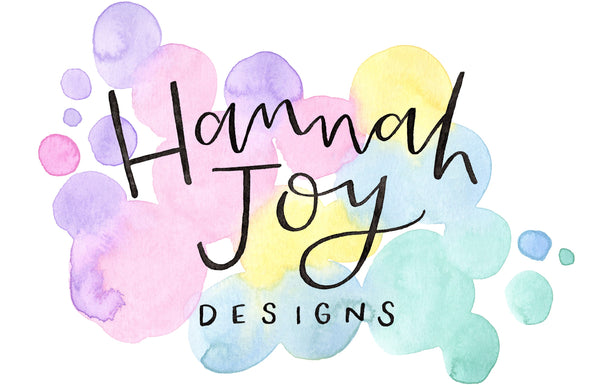Last week was mental health awareness week and it got me thinking about how we encourage children to express and understand their emotions.
For those of you that may not know I worked with children aged 0 - 11 for 14 years before starting Hannah Joy Designs and have experienced the whole scale of children’s emotions over the years.
The one thing that I used to remind myself all the time was, children have the same feelings we do but they don’t always understand what they are and how to control them. So it is up to us adults to be patient and help them to learn. Feelings are a fairly abstract concept and hard to understand even after 20,30,40 years of having them, so expecting a 3 year old to have mastered it is probably a bit unrealistic!

Children may express their emotions in a number of different ways other than saying how they feel - through their facial expressions, their body language, how they are playing and how they are behaving. So it is important to look for these cues and know when to step in and give some support.
Naming emotions so that children know what to call them when they are feeling them is really helpful, so that they can begin to tell you. Bring feelings up naturally in conversations with your child so that they can begin to understand their own and also the feelings of others. When you are playing together talk about how you are feeling and why, how the toys you are playing with might be feeling etc. Children learn through play and also express themselves through play so these conversations don't have to be heavy, talking about feelings can still be fun! And don't forget all the positive emotions too.
Children won’t always come to you, so be the one to start the conversation, ask how they are doing, how they feel about situations. Maybe suggest how that situation would make you feel to get the conversation started and to let them know that their feelings are ok too.
Talking to children about how emotions may feel physically in their bodies will help them to identify them and understand what is happening. Talk about the feeling in their tummy when they get nervous or their skin feeling tingly. Maybe they feel hot when they get angry or they might feel their heart beating faster.
Try not to dismiss or minimise their feelings, these are big feelings for children and they need to feel heard. Voicing that they are just over reacting or just want attention will make them feel unheard and will not help them work through the emotions. We know that having a tantrum over shoes being the the wrong colour is a bit ridiculous but to a 2 year old it's a representation of them trying to have some control and getting frustrated that their opinion/preference isn't being heard. I am not saying you need to change the colour of the shoes but what you do need to do is understand the frustration and not dismiss it as silly.
As an adult if you are upset or frustrated having some shout "CALM DOWN" at you is not helpful in any way, in fact it is likely to make us feel worse! The one benefit that we have as adults in that situation is that we mostly know what has made us upset and why, and we can explain it to the other person. Young children don’t always have that understanding and so instead of being able to articulate it they may have a physical reaction and lash out or they just become inconsolable. So give them some time and keep calm, let them know that is it is ok to feel cross and that you understand.

The most important thing is to be patient and at no time should you act in a way that makes then think that you don’t love them. I know that sounds extreme because of course you love them, but if you withdraw affection they may think this and the situation will escalate further.
You are their comfort and their safe place and so even if they have just done something that they shouldn’t and you are trying to make it clear to them that their behaviour is unacceptable, don’t make them feel like they are unacceptable. If they need a hug to calm down then that doesn’t undermine you telling them they did something wrong, it calms the situation down and gives you the chance to explain.
Let your child know that all feelings are acceptable and that is ok that they are frustrated or angry. However it is also important to give them tools to try to cope with any feelings that might be challenging such as anger, anxiousness and also over excitement. Maybe help them develop techniques to slow down their breathing for example.
Children learn how to express feelings appropriately by watching what you do and how you react in situations, so you are their best role model and most important role model. If you shout they will shout!
When trying to gain the attention of 20, 3 year olds at story time I always used to find that if I lowered my voice and read the story quieter, they all calmed down and focussed their attention more. If I just started reading the story louder to be heard, they all got louder too, and no one wants to have the Gruffalo shouted at them over the sound of a lively bunch of 3 year olds!
Children won’t talk about their feelings if they think it will worry you, so stay calm and hear them out. There is a high chance that if your child is upset, they are upset at you, try not to get defensive or take it personally, let them express how they feel before giving your point of view. Let's not assign blame to children for their emotions, show them compassion even when they mess up, there are always lessons to be learned but "I told you so" is rarely a helpful one.
Understanding and learning to control your emotions leads to developing resilience, positive feelings about yourself, confidence, better overall mental health and wellbeing and building better relationships. Which are all things that we want for children as they grow and develop into teens and adults. So praise and encourage your child when they manage to express themselves in a positive or constructive way. And remember even when it all feels like it is going wrong and they are kicking of on aisle 10 in Asda you have got this and you are doing an amazing job!


